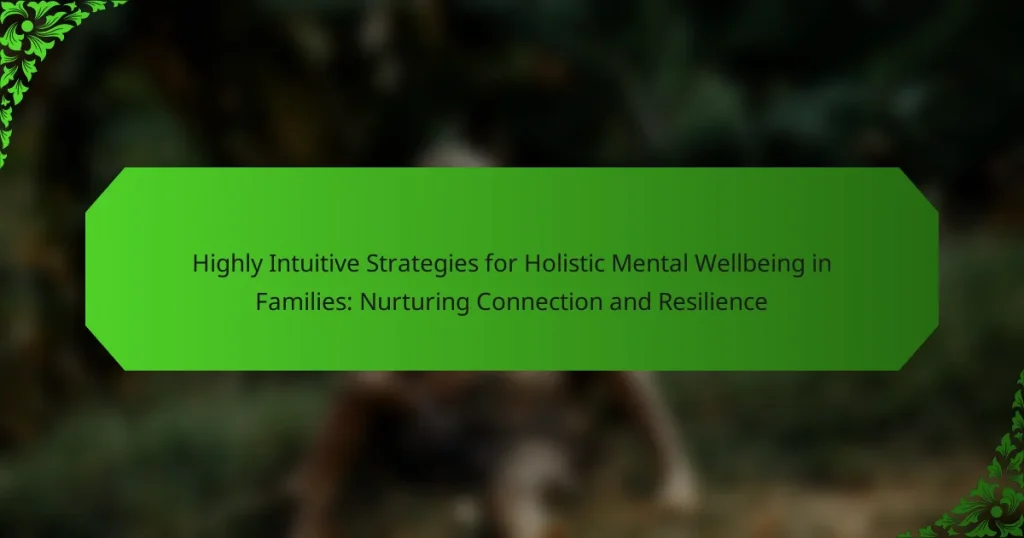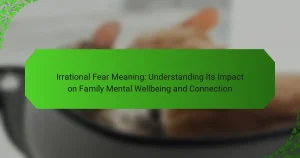Nurturing connection and resilience in families is essential for holistic mental wellbeing. This article explores strategies such as fostering open communication, establishing routines, and engaging in shared activities. It also highlights the importance of mindfulness practices and emotional intelligence in enhancing family dynamics. By implementing these approaches, families can create a supportive environment that promotes overall mental health.
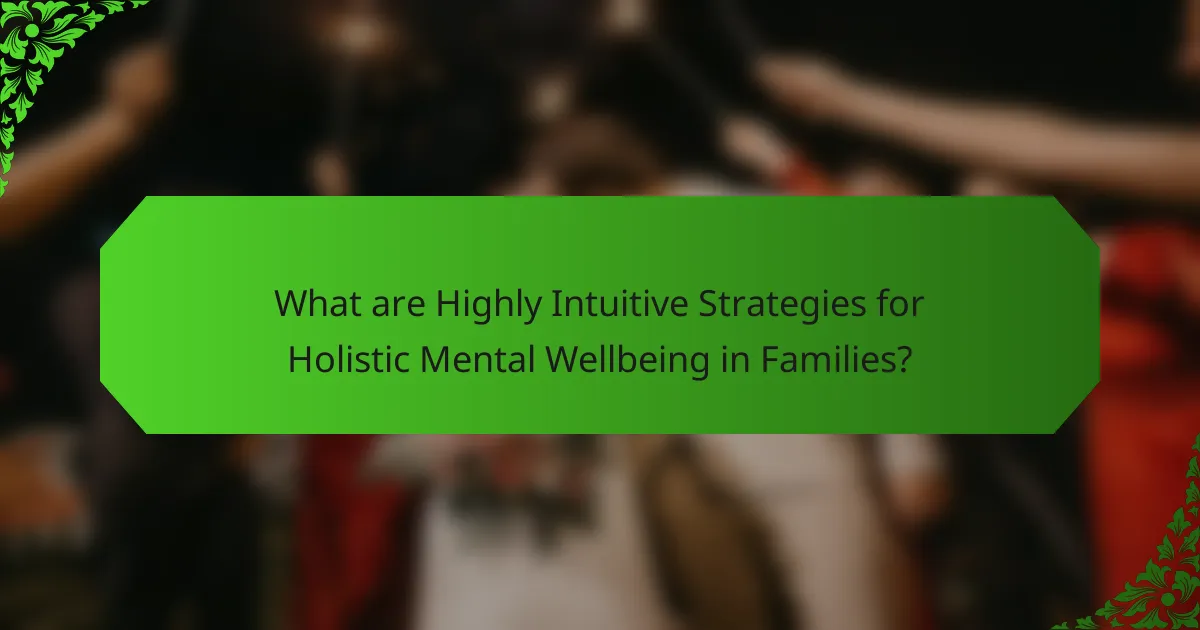
What are Highly Intuitive Strategies for Holistic Mental Wellbeing in Families?
Highly intuitive strategies for holistic mental wellbeing in families focus on nurturing connection and resilience. Engaging in regular family activities fosters strong relationships, enhancing emotional support. Practicing mindfulness together can improve stress management and promote a positive atmosphere. Open communication encourages sharing feelings and resolving conflicts effectively. Establishing routines provides stability, which is vital for mental wellbeing. Lastly, prioritising self-care for each family member ensures a balanced dynamic, contributing to overall family resilience.
How do these strategies foster connection among family members?
Highly intuitive strategies foster connection among family members by enhancing communication, empathy, and shared experiences. These strategies promote active listening, allowing each member to express their thoughts and feelings openly. As a result, families develop stronger emotional bonds and a greater sense of belonging. Engaging in collaborative activities, such as family meetings or shared hobbies, cultivates teamwork and mutual respect. This holistic approach nurtures resilience, enabling families to navigate challenges together while reinforcing their connections.
What role does resilience play in family mental wellbeing?
Resilience plays a crucial role in enhancing family mental wellbeing by fostering adaptability and emotional strength. It helps family members cope with stress and adversity, promoting healthier relationships. Resilient families communicate effectively, support each other, and develop problem-solving skills. This interconnectedness contributes to a positive family environment, reducing anxiety and depression. Additionally, resilience nurtures a sense of belonging, which is vital for overall mental health. Emphasising resilience within family dynamics can lead to improved emotional stability and a stronger support network.
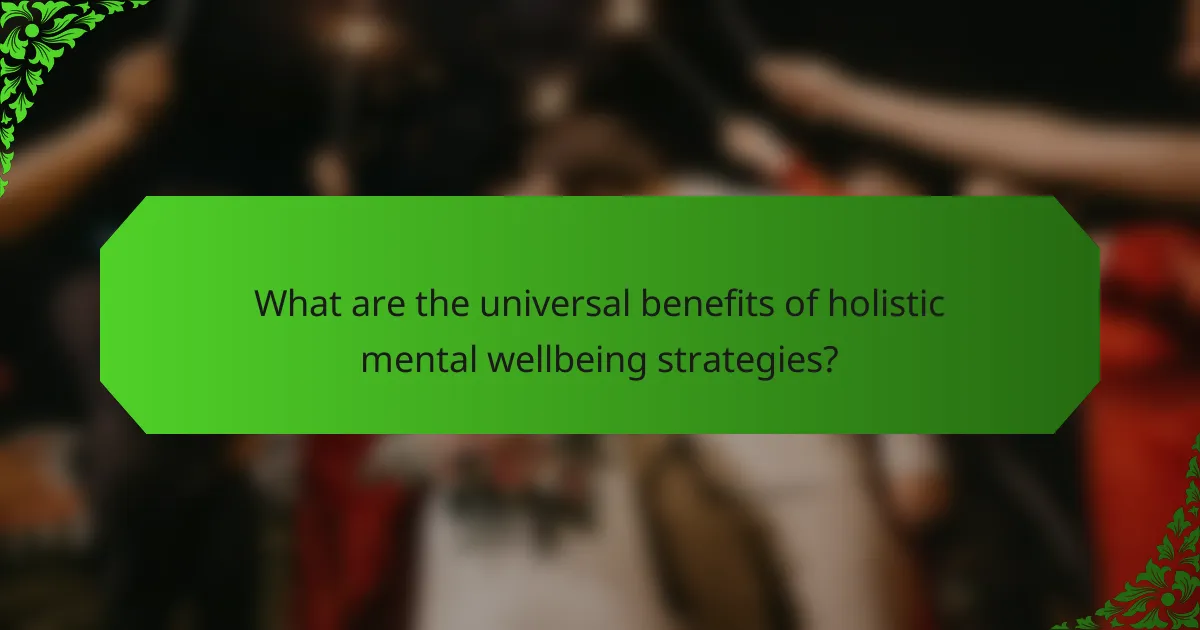
What are the universal benefits of holistic mental wellbeing strategies?
Holistic mental wellbeing strategies enhance family connection and resilience. These approaches foster emotional intelligence, improve communication, and reduce stress. Families practising these strategies often experience increased empathy and stronger support systems. As a result, they build a nurturing environment that promotes overall mental health.
How can emotional intelligence enhance family interactions?
Emotional intelligence enhances family interactions by fostering empathy, communication, and conflict resolution. Families with high emotional intelligence exhibit stronger connections and resilience. This capability allows members to understand and manage their emotions, leading to healthier relationships. For example, children learn to express feelings constructively, which reduces misunderstandings. As a result, emotional intelligence cultivates a supportive environment, promoting overall mental wellbeing.
What practices promote positive mental health for all family members?
Fostering positive mental health in families involves intentional practices that enhance connection and resilience. Regular family meetings can strengthen communication and emotional support. Engaging in shared activities, like cooking or playing games, promotes bonding. Practising gratitude together boosts overall well-being. Encouraging open discussions about feelings creates a safe space for expression. Setting aside quality time for each family member nurtures individual needs. Lastly, modelling healthy coping strategies during stress demonstrates effective resilience.

What unique attributes set these strategies apart?
Highly intuitive strategies for holistic mental wellbeing in families emphasise emotional intelligence, mindfulness practices, and open communication. These unique attributes foster deeper connections and resilience among family members, promoting a supportive environment. Emotional intelligence enhances empathy and understanding, while mindfulness practices reduce stress and improve focus. Open communication encourages honest dialogue, allowing families to address challenges collaboratively. Together, these strategies create a nurturing atmosphere that sets them apart from conventional approaches.
How do creative expression techniques contribute to family wellbeing?
Creative expression techniques enhance family wellbeing by fostering emotional connection and resilience. Engaging in activities like art, music, or storytelling allows family members to share feelings and experiences in a safe environment. This practice builds trust and understanding, which are essential for strong familial bonds. Studies indicate that families who engage in creative activities together report higher levels of satisfaction and emotional support. Furthermore, these techniques can serve as coping mechanisms during challenging times, promoting mental health and overall family cohesion.
What specific communication styles enhance family relationships?
Effective communication styles that enhance family relationships include active listening, open expression of feelings, and nonverbal cues. Active listening fosters understanding and validation among family members. Open expression of feelings promotes emotional intimacy and trust. Nonverbal cues, such as eye contact and body language, reinforce messages and strengthen connections. These strategies create a supportive environment, nurturing resilience and connection in family dynamics.
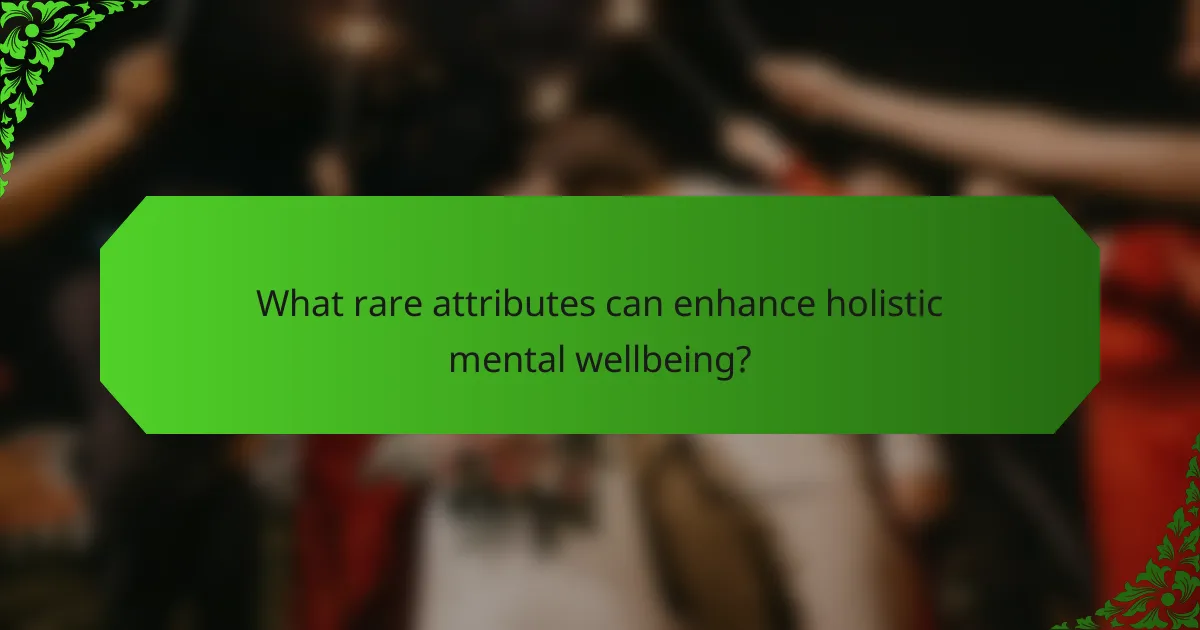
What rare attributes can enhance holistic mental wellbeing?
Engaging in rare attributes such as mindfulness practices, creative expression, and intergenerational storytelling can significantly enhance holistic mental wellbeing in families. These strategies foster deeper emotional connections and resilience. Mindfulness practices promote present-moment awareness, reducing anxiety. Creative expression allows for emotional release and exploration. Intergenerational storytelling strengthens family bonds and transmits values, enriching family dynamics. Embracing these attributes nurtures a supportive environment conducive to mental health.
What unconventional methods can families explore for mental health?
Families can explore unconventional methods for mental health by engaging in creative activities, practising mindfulness, and fostering open communication. Creative strategies, such as art therapy or music sessions, encourage self-expression and emotional release. Mindfulness practices, like yoga or meditation, enhance emotional regulation and resilience. Open communication nurtures trust and connection, allowing family members to share feelings and support one another. Integrating these strategies cultivates a holistic approach to mental wellbeing, strengthening family bonds and promoting overall resilience.
How can nature-based activities support family resilience?
Nature-based activities significantly enhance family resilience by fostering emotional bonds and promoting mental wellbeing. Engaging in outdoor experiences, such as hiking or gardening, encourages teamwork and communication among family members.
Research shows that spending time in nature reduces stress and anxiety, which strengthens familial connections. Additionally, these activities provide opportunities for shared experiences, creating lasting memories that contribute to a supportive family environment.
Families participating in nature-based activities often report improved problem-solving skills and adaptability, essential traits for resilience. Overall, integrating nature into family life nurtures both emotional health and resilience.
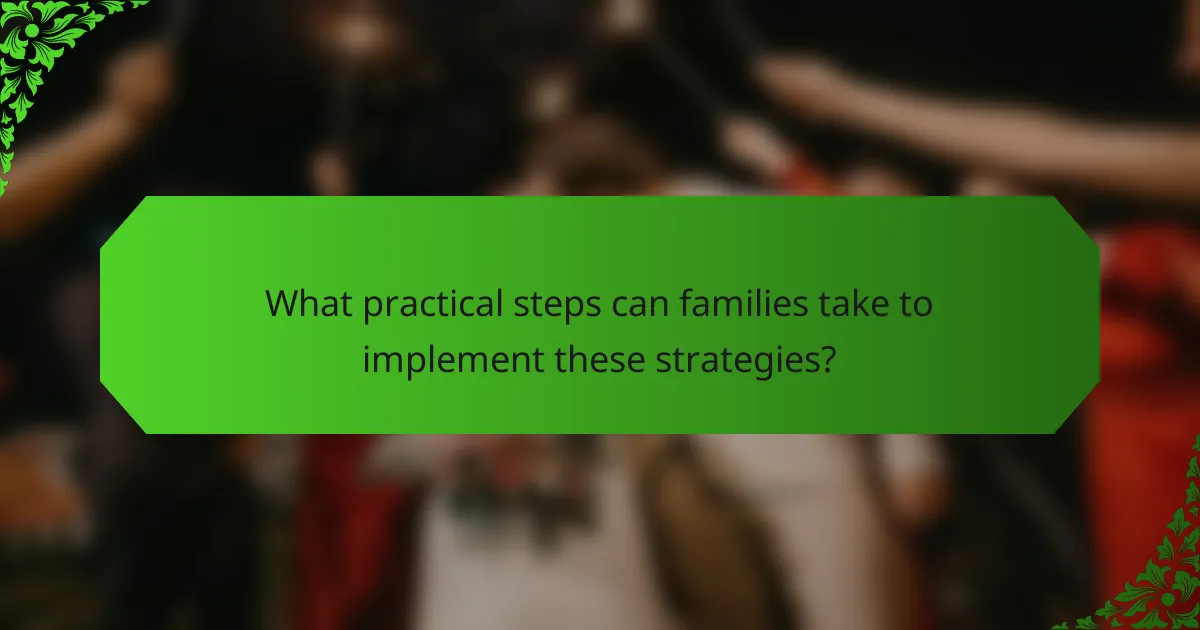
What practical steps can families take to implement these strategies?
Families can implement highly intuitive strategies for holistic mental wellbeing by fostering open communication, establishing routines, and encouraging shared activities.
1. Encourage open dialogue about feelings and experiences to strengthen emotional connections.
2. Create daily or weekly family rituals that promote stability and predictability.
3. Engage in activities together, such as cooking, exercising, or arts and crafts, to nurture collaboration and bonding.
4. Set aside technology-free time to focus on interpersonal connections and mindfulness.
5. Practise gratitude as a family by sharing positive experiences or achievements regularly.
6. Seek professional guidance when needed to enhance family dynamics and resilience.
What daily routines can strengthen family connections?
Daily routines that strengthen family connections include shared meals, regular family meetings, and collaborative activities. Engaging in these practices fosters communication and emotional bonding. For example, having dinner together allows for open discussions, while family meetings can address concerns and celebrate achievements. Collaborative activities, such as game nights or outdoor adventures, create shared memories and enhance teamwork. These routines nurture resilience by building a supportive family environment.
How can families incorporate mindfulness into their daily lives?
Families can incorporate mindfulness into daily life through simple, intentional practices. Start with brief moments of silence during meals, allowing everyone to reflect and appreciate their food. Engage in mindful breathing exercises together, which can be done in under five minutes. Establish a weekly family mindfulness activity, such as nature walks or yoga sessions, to strengthen connection. Encourage open discussions about emotions, promoting resilience and understanding among family members. These strategies nurture holistic mental wellbeing by fostering a supportive environment.
What resources are available for families seeking support?
Families seeking support can access various resources, including community organizations, online platforms, and professional services. Community organizations often offer workshops and support groups that foster connection. Online platforms provide educational materials and forums for sharing experiences. Professional services include therapists and counsellors specializing in family dynamics. Each resource contributes to holistic mental wellbeing by nurturing resilience and connection.
What common mistakes should families avoid in their mental wellbeing journey?
Families should avoid common mistakes that hinder their mental wellbeing journey, such as neglecting open communication, overlooking individual needs, and dismissing professional help. Prioritise active listening to nurture connection and resilience. Encourage each family member to express feelings and concerns, fostering a supportive environment. Recognise that mental wellbeing is a shared responsibility, requiring collective efforts and understanding. Avoiding these pitfalls can significantly enhance the family’s holistic mental wellbeing.
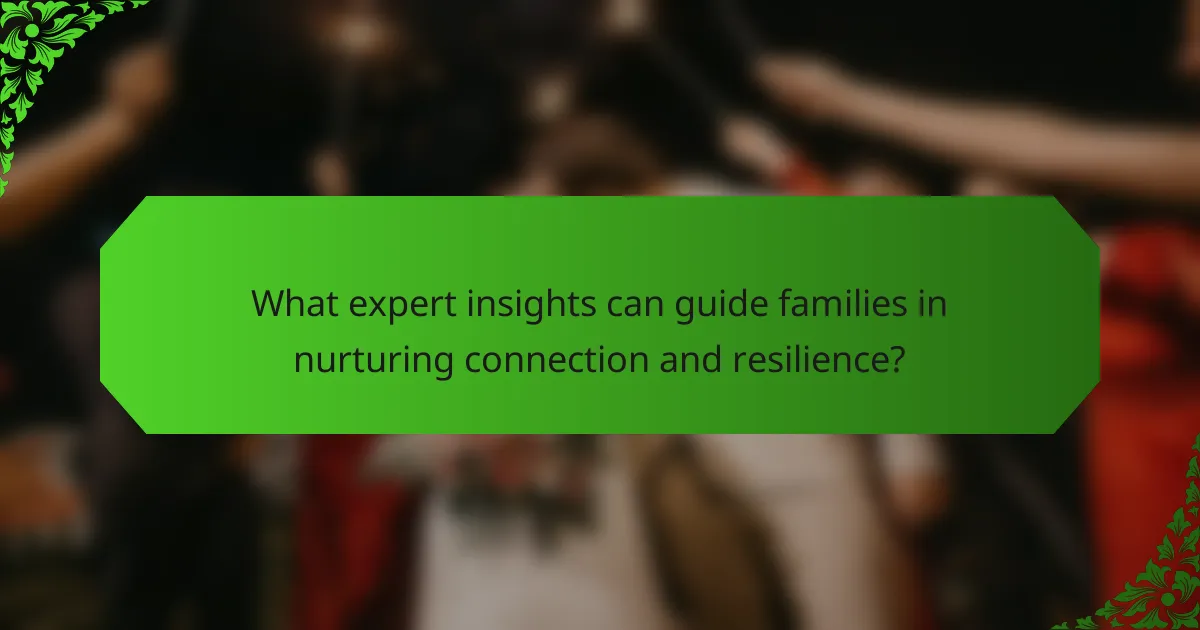
What expert insights can guide families in nurturing connection and resilience?
Expert insights emphasise fostering emotional intelligence, open communication, and shared activities to nurture connection and resilience in families. Prioritising emotional awareness helps family members understand each other better. Engaging in regular family meetings can enhance communication, allowing everyone to express feelings and concerns. Additionally, participating in shared activities, such as cooking or outdoor adventures, strengthens bonds and creates lasting memories. Research indicates that families who practice these strategies report higher levels of connection and resilience, ultimately leading to improved mental wellbeing.
What are the best practices for sustaining holistic mental wellbeing?
To sustain holistic mental wellbeing in families, prioritise connection and resilience through intentional practices. Engage in regular family activities that foster open communication and emotional support. Establish routines that promote mindfulness, such as family meditation or shared meals. Encourage individual expression by validating each member’s feelings and experiences. Create a safe space for discussing challenges and celebrating successes. Foster resilience by modelling problem-solving strategies and adaptability in the face of adversity. These practices strengthen bonds and enhance overall mental wellness within the family unit.
